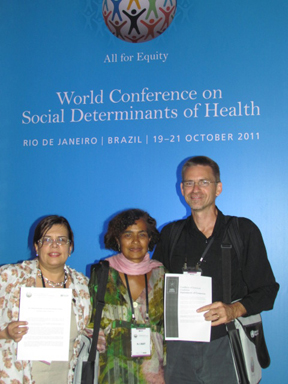What role for BINGOs and PINGOs?
WHO gets tougher
Alongside another new coalition, Democratising Global Health, we used the COI Statement in follow-up discussions before and during the WHO Executive Board in January 2012. Dr Chan, WHO’s Director General, is now making it much clearer that the Private Sector should not be present at any WHO meetings setting ‘norms and standards’.
A Draft Resolution on NCDs was adopted containing two strong references to Conflicts of Interest. In the debates about WHO Reform Member States called for WHO’s independence and integrity to be protected from “undue influence by those with vested interests.”
Breastfeeding targets
Global Targets for maternal, infant and young child nutrition will also be on the agenda of the World Health Assembly this year and were discussed already in January. One target calls on governments to “increase exclusive breastfeeding rates of infants under the age of six months to 50% at global level.” Another requests the WHO Director General to “develop guidelines on the marketing of complementary foods.”
Picking the right partners
The Roll Back Malaria Partnership is often cited as a good model of a Public Private Partnership. But is it appropriate for the NCD problem which is largely corporate-led? Surely no-one would partner a mosquito?
Rio Declaration on health inequalities betrays the promise to ‘close the gap in a generation.’
The WHO World Conference on Social Determinants of Health issued the Rio Declaration on 21 October 2011. Baby Milk Action joined other civil society organisations at the meeting to call on government representatives to counter what WHO’s own expert Commission called “the toxic combination of poor social policies, unfair economic arrangements and bad politics that results in the unequal distribution of health-damaging experiences” in its report “Closing the Gap in a Generation.”
Few of the concrete proposals from the WHO Commission made it into the official Declaration, though many were picked up in an alternative civil society declaration coordinated by the People’s Health Movement (PHM).
Professor David Sanders of the University of the Western Cape and PHM received a standing ovation during the final discussion panel on the closing day of the conference after questioning why trade, climate change, the brain drain of health workers from developing countries to rich countries and other issues have been totally ignored in the official Rio Declaration.
The official Rio Declaration calls for collaboration with stakeholders, including the private sector. However, after the Conflicts of Interests Coalition statement was distributed to delegates, two more references related to the need to safeguard against conflicts of interest were included in the declaration - click here for full details.
- Contact Baby Milk Action to add your organisation's name to the Conflicts of Interests Coalition statement.
Regina Da Silva, Sonia de Oliveira Brady and Mike Brady with the Rio Declaration and the Conflicts of Interest Coalition statement of concern







